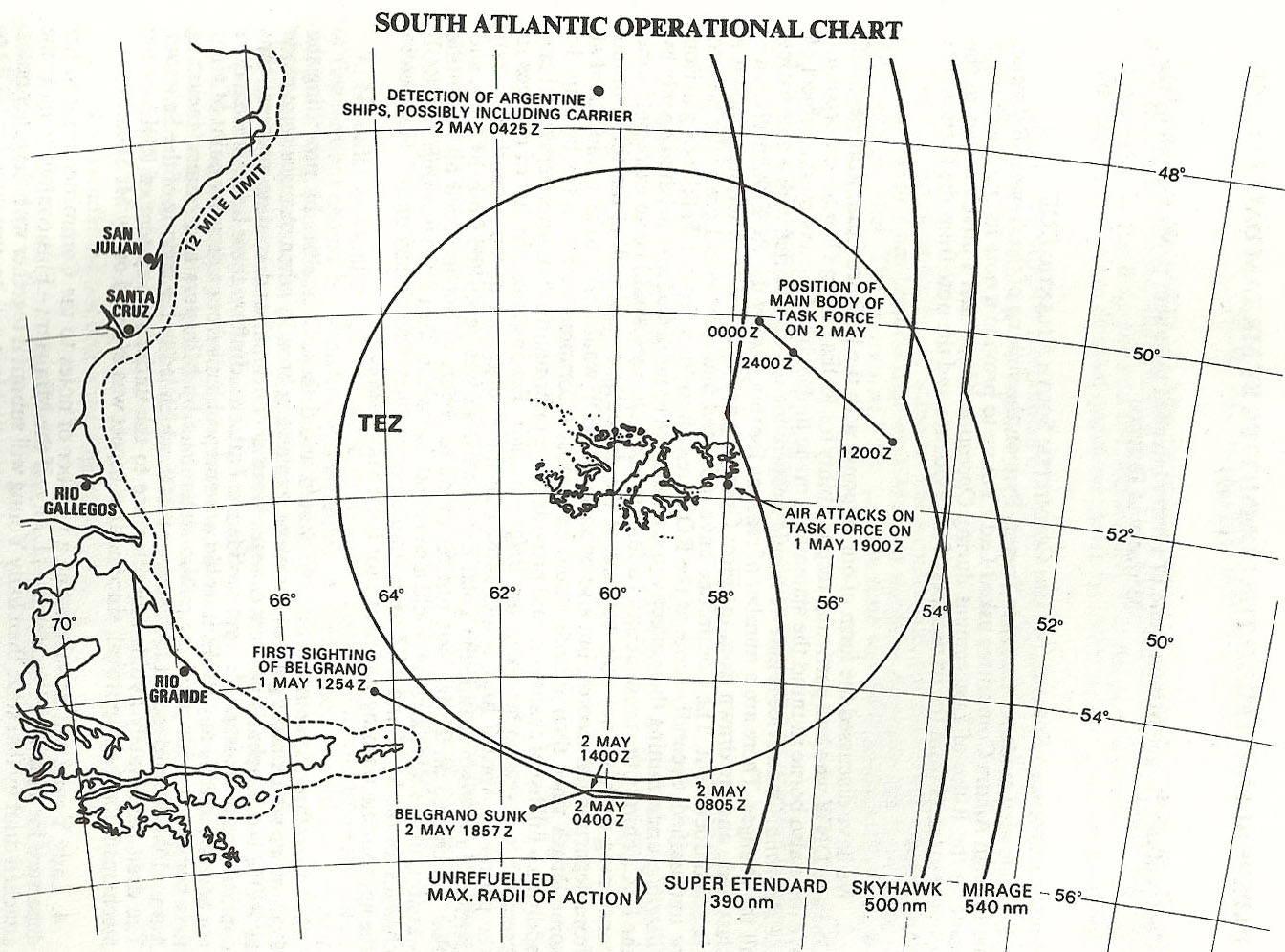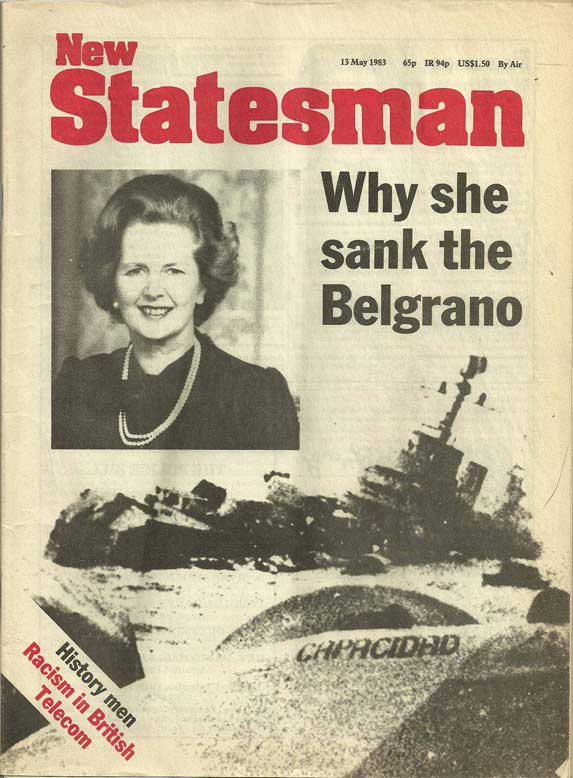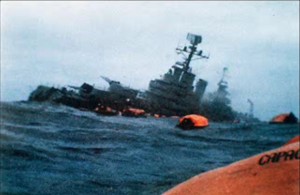HISTORICAL BACKGROUND TO THE SINKING OF THE BELGRANO
We have the act itself (the sinking of a ship), as well as the end to be gained (keep the British government in power and torpedo a peace initiative) and the circumstances surrounding it (an attack outside the exclusion zone in an undeclared war).
The History of the south Atlantic conflict The War for the Malvinas Ruben Moro 1989, p.165.
The ARA General Belgrano was an Argentine Navy cruiser which was controversially sunk by a British submarine during the 1982 Falklands War as she sailed away from the conflict zone. 323 people died, mainly young sea cadets.
Originally a US Navy cruiser, launched in 1938, the ship survived the Japanese attack on Pearl Harbor and was decommissioned from the US Navy in 1946. In 1951, the ship was sold to Argentina. In 1956, the ship was renamed ARA General Belgrano after a hero of the Argentine war of independence.
On April 26th, 1982, the General Belgrano, accompanied by two destroyers, left the port of Ushuaia in southern Argentina. On April 29th, the Argentine task group began patrolling South of the Falkland Islands. On the following day, the ship was detected by the British nuclear submarine HMS Conqueror which gradually closed over the next day. On May 2nd, HMS Conqueror fired three Mk 8 mod 4 torpedoes, two of which hit the Belgrano.
With the ship holed, no electrical power, and unable to pump out water, the Belgrano soon began to list to port and sink towards the bow. Captain Hector Bonzo therefore ordered the crew to abandon ship using the seventy-odd rubber dingys.
Tragically, the Belgrano’s two escorts did not know that something had happened to the Belgrano and continued on a westward course. By the time that the escorts realized something had happened to the Belgrano, it was already dark, the weather had worsened, and the Belgrano’s life rafts had been scattered.
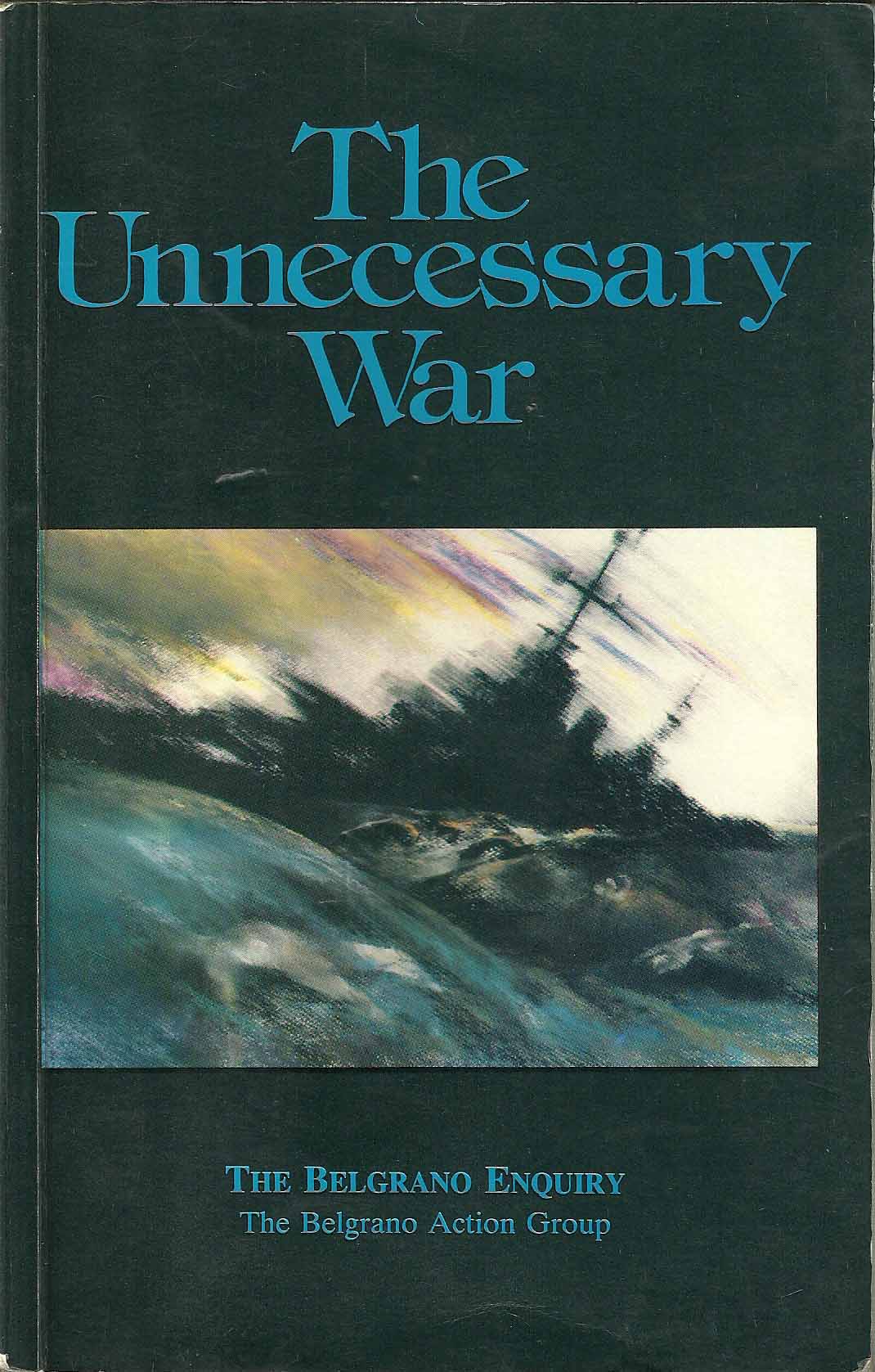 Consequently, even though Argentine and Chilean ships did rescue 770 men over the next two days, 321 members of the Belgrano’s crew died. In early editions on Tuesday May 4th, 1982, Britain’s The Sun newspaper led with the infamous headline “GOTCHA”: “Our lads sink gunboat and hole cruiser”. When news began to emerge that the Belgrano had indeed been sunk, with a large number of casualties, later editions of the Sun led with the more sombre headline “Did 1,200 Argies drown?”
Consequently, even though Argentine and Chilean ships did rescue 770 men over the next two days, 321 members of the Belgrano’s crew died. In early editions on Tuesday May 4th, 1982, Britain’s The Sun newspaper led with the infamous headline “GOTCHA”: “Our lads sink gunboat and hole cruiser”. When news began to emerge that the Belgrano had indeed been sunk, with a large number of casualties, later editions of the Sun led with the more sombre headline “Did 1,200 Argies drown?”
THE CONTROVERSY
The sinking of the Belgrano became a cause célèbre for anti-war campaigners in Britain. This was for a variety of reasons, including the ship being well outside the 200 mile (320 kilometre) Total Exclusion Zone that the British had declared around the Falklands, because the ship was on a westerly heading at the time it was attacked, and because a Peruvian peace proposal was still on the table at the time of the attack.
Was the sinking of the Belgrano justifiable under international law?
Some argue that, the ship being outside the British-declared Total Exclusion Zone would not affect this analysis, since the British Government stated on April 23rd, that ‘the approach’ of any warship or aircraft ‘which could amount to a threat to interfere with the mission of the British forces in the South Atlantic’ would encounter an ‘appropriate’ response. The Belgrano was neither ‘approaching’ the task force and was it a ‘threat’? That statement was put out while the British task force was still travelling South, as a warning that any approaching aircraft etc might be shot. Once the Task Force had arrived, it then announced on 28 April the Total Exclusion Zone – and, that would have superceded an earlier statement. War was not declared, that is why these definitions were important.
Some Argentine Views
on May 3rd 1982, Argentina’s Foreign Ministry released a statement, that the sinking of the Belgrano was “at a point at the 55 º 24 ‘south latitude and 61 º 32′ west longitude. That this point is located 36 miles outside the area maritime exclusion set by the government of Great Britain. Such an attack is a treacherous act of armed aggression.’
Was it? Debate has raged on this issue, mostly misinformed due to the torrent of British MOD fabrications. This website will enable you to have that calm debate you always wanted to, but based on correct info.
Let’s hear a statement by Alicia Pierini, Ombudsman of the City of Buenos Aires on April 25 2005:
“The Argentine ship was away from the area of belligerency, not navigating towards it and not even close to any British units: so it could not have been any threat or danger to the United Kingdom. Torpedoing it was, quite simply, a war crime, through the disproportionate and illegitimate use of force in violation of the rights of those who fought then. Why would Britain have designated the exclusion zone – thus drawing the boundaries of war-theater – if it was immediately to be violated? “
Political analyst Rosendo Fraga expressed the following cautious view, immediately prior to Lawrence Freedman’s Official History appearing in 2005:
The debate over whether the British attack took place within the international rules to be respected in conflict or outside, is controversial. Probably resolving the issue will be the function of legal historians, politicians and diplomats. The reality is that the cruiser was sunk by breaking rules, but the international community seems to have taken over the matter, not mostly sharing this view. For Argentines, the idea that the cruiser was sunk in violation of the rules will remain as a manifestation of the Argentine claim to sovereignty, though the world does not share this view and only historians can give a more definitive opinion about it.
Vice Admiral Juan Jose Lombardo, in an interview published in the NATION March 31, 2001 said this:
“I gave the order to attack on 1 May. When the British force set out to land would be the key moment of danger and their whole strategy would be to defend people who disembarked. Then they put all their elements, including submarines, to defend that position. That was the moment when we had to take the opportunity to do something. It was time to think about a transport strike, a damaged ship [?]. But, three groups of attack open to the West to wrap and search vessels were lost [?]. Six hours, after I send a new message to Allara (the head of the fleet of sea) landing there, that because of serious danger to their ships, they should retire? “
Six hours after the abortive Argenine attempt to attack, on May 1st, he gave the order to retire. That is important as a statement by the man who was the Commander-in-Chief of the Argentine South Atlantic Theatre of Operations.
In 1994, Argentina added its claim to the islands to the Argentine constitution, stating that this claim must be pursued in a manner “respectful of the way of life of their inhabitants and according to the principles of international law.” It would be strange if also in 1994 the Argentine government conceded that the sinking of the Belgrano had been a “legal act of war?” The evidence heard at the Belgrano Inquiry – here summarised – offers an alternative view. You decide.
It would have been a legal act of war if the Belgrano had either the intention or the capability to threaten Britain’s Task Force. Did it? That depends upon what its mission was. Arguments of ‘military necessity’ for sinking have a logistical problem: had it been perceived as a threat to the Task Force, that would have happened on May 1st, while it was sailing East, towards the Task Force. That didn’t happen. Only after it had turned round and had been sailing East, for 11 hours, away from the fleet, was it sunk.
That’s what it was doing.
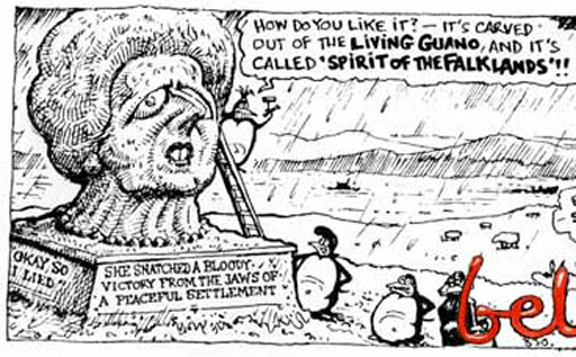
Cartoon by Steve Bell
Thirty Years Later …
January 2012: The sky is darkened with the lame ducks of Britain’s Falklands policy coming home to roost.
The UK is now re-violating the Treaty of Tlatelolco, which it did thirty years ago by bringing ships such as HMS Sheffield, armed with nuclear depth-charges, into the conflict. South America is a nuclear-weapons free zone. Britain has announced in January 2012 that it was sending a nuclear-armed destroyer, HMS Dauntless, to the South Atlantic region.
America has put out a humiliating-for-Britain policy statement alluding to ‘Los Malvinas,’ i.e. using the Argentine word for the Falkland islands, and describing the British occupation of it as ‘de facto’ – and that means, in contrast with de Jure. De Jure means occupation by right, de facto just means, they’re there because they’re there. One British conservative analyst called this statement, “hugely insulting to Britain.” The US has affirmed:
This is a bilateral issue that needs to be worked out directly between the governments of Argentina and the United Kingdom. We encourage both parties to resolve their differences through dialogue in normal diplomatic channels,
adding that “we recognize de facto United Kingdom administration of the Islands but take no position regarding sovereignty.”
Fox News reported that the Obama Administration was backing Argentina over the U.K. in the Falklands dispute. The Organization of American States earlier this week adopted a declaration calling for negotiations between the UK and Argentina over the “sovereignty” of the Falkland Islands. While the U.S. delegation did not speak in support of the measure, it ultimately joined a consensus adopting it.
That basically puts the negotiating situation back to where it was in January-February 1982, before the war broke out…
Prime Minister Cameron accused Argentina of being ‘colonialist’ in its demands for sovereignty over the Falklands. In response, President Cristina Fernandez de Kirchner told Mr Cameron to re-read his history books. Prince William is being posted to the islands as an RAF search-and-rescue pilot next month – a move Argentina attacked as ‘provocative.’
In response the South American trading bloc, Mercosur, is closing its ports to all ships flying the Falklands flag. Britian’s Foreign Office has closed half a dozen embassies in Latin America in recent years, to minimise the danger of receiving subversive opinions from foreign capitals. If oil is found in commercial quantities it will be difficult for any company to exploit it without the assistance and co-operation of the Argentinian mainland.
Argentine protesters have burnt the Union flag outside British Embassy in Buenos Aires in rage over Cameron’s pledge on Falklands, urging their government to sever diplomatic links with London
Former head of the British army General Sir Michael Jackson said that it would be impossible for the British military to confront Argentina in case a military confrontation takes place over the sovereignty of the Malvinas islands. “What if an Argentinean force was able to secure the Mount Pleasant airfield? Then our ability to recover the islands now would be just about impossible,” said Jackson in an interview with the Sunday Telegraph.
Likewise the head of the Naval task force in the Falklands War has warned that defence cuts mean Britain can now do “precisely nothing” to prevent Argentina retaking the islands. the Royal Navy no longer has aircraft carriers, has lost its force of Harrier jump jets and seen its warship fleet cut in half over the last decade. General Sir Peter Whiteley, a former commandant general of the Royal Marines, said: ‘If the Argentines decided to invade again we could never consider trying to take them (the Falklands) back because of our lack of naval resources.’ And Surgeon Rear Admiral Ralph Curr, the Royal Navy’s former medical director-general, added: ‘There’s no way we could defend the Falklands or re-engage the Argentines if it all happened again.’ In the Telegraph’s view, Britain can do ‘nothing’ to prevent Argentina retaking Falkland Islands.
Argentine asserts sovreignty over Falkaland Islands http://www.presstv.ir/detail/231772.html March 2012
The Argentine senate has unanimously voted for a measure asserting the South American country’s “legitimate sovereignty” over the disputed Malvinas Islands. The draft document, known as the “Ushuaia Declaration,” was adopted ahead of the 30th anniversary of the war between Argentina and Britain over the islands, also known as the Falklands.The declaration also rejected “the persistent colonialist and militarist attitude of the United Kingdom” and warned against the “militarization” of the Malvinas. Britain has deployed its most sophisticated warship, HMS Dauntless, and a nuclear submarine to the South Atlantic to prevent Argentina’s possible counter-move. Tensions have been mounting in recent months over the South Atlantic islands, with the UN calling on Britain to discuss decolonization, but the UK has so far refused to do so.

